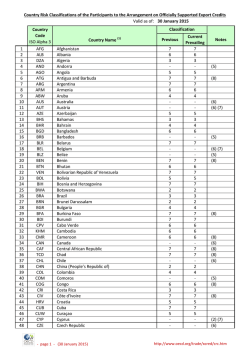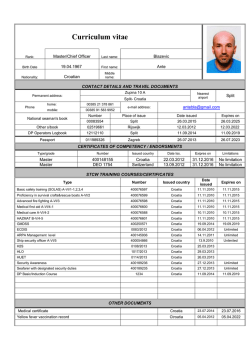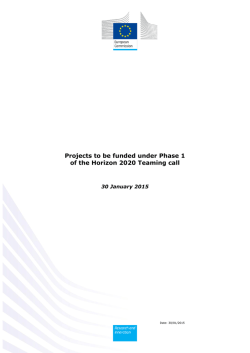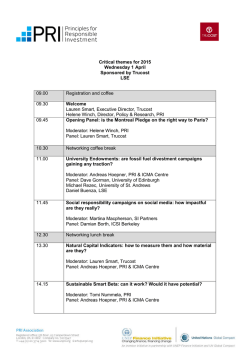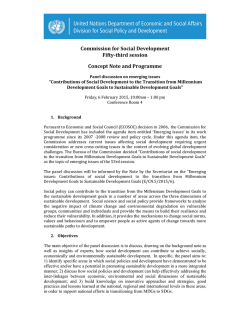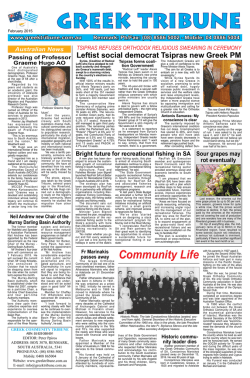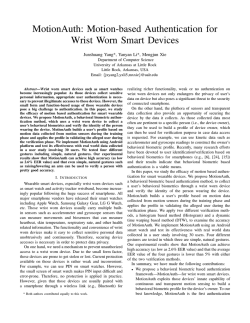
Student report notebook kit (cover, binder spine, divider tabs)
I N T E R NAT I O NA L ST U DY AS S O C I AT I O N ON T EAC H E R S A N D T EAC H I N G ( I SAT T ) REGIONAL MEETING “RESEARCH ON TEACHERS AND TEACHING” 2 FEBRUARY 2015 I N FO R M AT I O NAL B O O K L E T Regional Meeting “Research on Teachers and Teaching” University of Cyprus, Nicosia, Cyprus 2 February 2015 Organizers ISATT (International Study Association on Teachers and Teaching) & Department of Education Postgraduate Programme ‘Curriculum and Instruction’ University of Cyprus Host Institution University of Cyprus Professor Mary Koutselini 1 2 Host Institution University of Cyprus Department of Education Professor Mary Koutselini Mary Koutselini is Professor of Curriculum and Instruction at the University of Cyprus, Chair holder of the UNESCO chair in Gender Equality and Women’s Empowerment, Head person of the Department of Education and Head person of the Center of Gender studies of the University of Cyprus. Her areas of specialization and research interest are: Teachers’ Education, Curriculum and Instruction, Action Research and Gender Studies. She participates in a great number of National and International Academic and Social Councils and she published extensively in the areas of her research interests, more than 100 research papers in refereed journals, 15 books and invited chapters in books. She is also the Coordinator and the principal researcher of 14 International, European and National Research programmes, i.e. GERI (2014-2016) Europe for Citizens: Commitment to Democracy through increasing women’s participation in the political life, EACEA (LLP - key activity 1, 2012-2013) RELEASE, Self-regulated Learning as a Core in Teachers InService Training. 3 CONTENTS Page Programme: ………………………………………………………………………………………….. 5 Presentations: PhD students present their research – Discussion …………………………………………………………………………………………… 6 Speeches and Lectures: Keynote Lecture …………………………………………….……………………………………………… 10 Presentations, Department of Education, University of Cyprus ……………………………………………………………………………………………. 11 Symposium on Regional Teacher Education and Research ……………………..……………………………………………………………………… 14 4 PROGRAMME Monday, 2 February 2015 Venue: The main auditorium (Assembly hall) of the University of Cyprus (75 Kallipoleos Avenue), Nicosia 10:00 – 13.00 Presentations: PhD students present their research – Discussion 13:00 – 15:00 LUNCH 15:00 – 15:30 Registration 15:30 – 16.45 Speeches and Lectures 15.30 – 15.45 Welcome Speeches Rector Constantinos Christofides Professor Mary Koutselini 15:45-16:30 Keynote Lecture “ Teaching and teacher education: Growing and sustaining the teachers we need ” Professor Cheryl Craig (USA), Secretary, ISATT 16.30 – 16.45 Discussion 16:45 – 17.45 Presentations, Department of Education, University of Cyprus 16.45 – 17.10 (a) Exploring the potential of video as a reflection tool during practicum: issues, challenges and lessons learnt 17:10 – 17:30 (b) (De)constructing modalities of comparative educational thinking through video-use Ch. Charalambous & St. Philippou, Lecturers; G. Olympiou, STP, UCY L. Klerides, Lecturer, UCY 17.30 – 17.45 Audience Queries and Responses 17.45 – 18.15 COFFEE BREAK 18.15 – 20:00 Symposium on Regional Teacher Education and Research Panel Moderator: Dr. Jan Broeckmans (Belgium), Treasurer, ISATT Panel Discussant: Dr. Maria Assunção Flores (Portugal), Chair, ISATT Panel Presenter: Pr. Leonidas Kyriakides, Cyprus Panel Presenter: Pr. Ronald Sultana, Malta Panel Presenter: Pr. Ruth Zuzovsky, Israel Panel Presenter: Pr. John Katsillis, Greece Panel Presenter: Senior Pr. Fatima Sadiqi, Morocco Audience Members’ Queries and Responses 5 (10:00-13:00) Presentations: PhD students present their research – Discussion PRESENTATION 1 Title: Unpacking teacher knowledge: Exploring its structure and contribution to student learning Sofia Agathaggelou, Postgraduate Programme ‘Curriculum and Instruction’ Abstract: This study examined the nature of teacher knowledge in terms of Shulman’s (1986, 1987) three most prominent components of teacher knowledge content knowledge (CK), general pedagogical knowledge (PK) and pedagogical content knowledge (PCK) - in the subject area of mathematics. It also explored the association between in-service teacher knowledge and their students’ learning in mathematics. To address the abovementioned aims, a measurement aim of developing a reliable and valid instrument for the measurement of the three knowledge components was set. Specifically, the study: (a) explored whether a scale with good psychometric properties and which encompasses the three components of teacher knowledge can be developed, and, if so, what patterns in terms of teacher knowledge can be identified, (b) investigated the structure and organization of teacher knowledge regarding the three types of knowledge, and (c) examined the contribution of teacher knowledge to student learning gains, net of other student and teacher background characteristics. Data were collected through a student test and an open-ended survey, measuring teacher CK, PK, and PCK. The student test was administered to 1543 fifth- and sixth-grade elementary school students twice to examine their learning progress. The teacher survey was completed by 379 teachers. Several methodological decisions were taken in consideration in developing the study instruments: The student test was aligned in content with the teacher survey, by limiting attention to only a key domain in elementary school mathematics, namely, fractions. Both instruments were also aligned with the curriculum in operation. Additionally, three core teaching practices were captured: providing explanations, analyzing student thinking/misconceptions, and selecting, modifying, and ordering instructional tasks. Item Response Theory (IRT) models, Structural Equation Modeling (SEM) analyses, and a two-level hierarchical linear model analysis were utilized to address the research questions of the study. The study findings suggested that it was possible to develop a scale with good psychometric properties that encompasses CK, PK, and PCK simultaneously, lending support to Shulman’s theoretical conceptualization (1987) that teacher knowledge - as an overarching construct - consists of different subcomponents. At the same time, the scale provided evidence that CK forms a prerequisite for the development of PCK. This resonated with evidence from the qualitative analysis, as well as with the fact that CK and PCK were found to form two distinct factors in the SEM 6 analyses, which were correlated. PK items had mixed item difficulties in the scale. In the SEM analysis, that used a subset of the items, PK was found to form a single factor, uncorrelated with either CK or PCK. Regarding the contribution of teacher knowledge to student learning, a curvilinear effect was found for fifth-grade students, implying that there is an optimal teacher knowledge level before and after which teachers might be less effective in terms of supporting student learning. This was replicated neither for the entire sample nor for sixth-graders. Admittedly, teacher knowledge explained only a small portion of the unexplained variance in student learning; however, it represented 15% of the unexplained variance at the teacher level. Also, while most of the student and teacher variables under exploration did not have a statistically significant contribution to student learning, teacher knowledge was found to have such a contribution. The results of the study indicate the promise and the challenges that exist in unpacking the knowledge needed for the work of teaching and exploring associations among teacher knowledge, teaching, and student learning. Attention is given in particular to the challenges that inhere in measuring teacher knowledge in educational contexts in which there is not such a culture. Without underestimating its limitations, the study concludes by discussing the theoretical, methodological, and practical implications of the findings. PRESENTATION 2 Title: The contribution of gestures in geometrical thinking development in early childhood Kyriakoulla Evangelou, Postgraduate Programme ‘Mathematics Education’ Abstract: Gesture has privileged access to information that children know but do not articulate. As such, it can serve as an additional window to the mind of the developing child. Gesture might, however, do more than merely reflect understanding (Goldin-Meadow, 2000). They takes an important role not only in students’ learning and communication, but also in teacher’s communication and practice. In a cognitive analysis of geometrical thinking, Duval (1995, 1999) distinguishes four apprehensions for a “geometrical figure”: perceptual, sequential, discursive and operative. In the kindergarten it is more feasible to teach mainly two basic apprehensions of figures: the perceptual apprehension, and the operative apprehension. Furthermore, despite the emphasis given in the literature on young children’s geometrical abilities (e.g., Sarama & Clements, 2009), on the one hand, and more recently on students’ use of gestures in the learning of mathematics (e.g., Radford, 2009) on the other hand, investigating children’s gestures and their dynamics with verbalization in studying changes in early geometrical understanding has received limited attention. This study aims to contribute to improving our understanding of the above issues. In particular, in this study we are interested in gaining insight into 7 the nature and role of gestures, and the variation that gestures and speech undergo in communicating and building understanding of geometrical concepts at a kindergarten level. Another important aspect of educational research which our study aims to explore concerns the role gestures might take in teacher-child and child-child interactions in early geometry learning. Specifically, we will examine how the kindergarten teachers’ and peers’ gestures and speech acts in the class exert their effects on the processes children go through in the understanding of geometrical figures and spatial transformations (e.g., rotation, translation). Furthermore, we aim to examine whether a geometry teaching approach which promotes the production of specific mathematics-related iconic gestures and the dynamics between gestures, discourse and other semiotic resources (e.g., visual representations of geometrical figures), can contribute to the development of young children’s geometrical figure apprehension. Finally, we intend to develop theoretically based models which will capture the structure of kindergarten children’s apprehension of geometrical figures. PRESENTATION 3 Title: Factors promoting quality of education at classroom and school level: A European effectiveness study Anastasia Panayiotou, Postgraduate Programme ‘Educational Administration and Evaluation’ Abstract: This study aims to provide answers to current debates on the improvement of learning outcomes and on specific issues such as whether factors that operate at the classroom and school level can explain variation in student achievement gains in six European countries with rather different educational contexts. In this context, this research aims to further develop a theoretical framework that can be used to provide answers to questions concerned with the factors that are considered to have both direct and indirect effects on student achievement. Specifically, the extent to which the dynamic model of educational effectiveness can be used as a starting point for establishing a theory-driven and evidence-based approach to educational effectiveness is investigated. In each participating country (i.e., Belgium/Flanders, Cyprus, Germany, Greece, Ireland, and Slovenia), a sample of at least 50 primary schools was drawn and tests in mathematics and science were administered to all grade 4 students (n=10742) at the beginning and at the end of the school year 2010-2011. Students were also asked to complete a questionnaire measuring teacher behavior in classroom (i.e., quality of teaching). Data on the school factors of the dynamic model were measured by administrating a questionnaire to all the teachers of the school sample in each country (n=2923). Multilevel analysis revealed that quality of teaching, policy on teaching, and the school learning environment explain student achievement gains in mathematics and science, while descriptive analyses show that there is scope for improving the teacher and school factors of the dynamic model. Implications for research are drawn. 8 PRESENTATION 4 Title: Using the dynamic approach to teacher professional development to promote formative assessment Margarita Christofidou, Postgraduate Programme ‘Educational Administration and Evaluation’ Abstract: This study is in line with recent attempts to bring together research findings from the areas of Educational Effectiveness Research and Teacher Professional Development Research, linking these findings directly to the area of classroom assessment. In this context, this study aims to investigate in more detail the development of teachers’ skills in assessment. The methods and results of a study comparing the impact of the Dynamic Integrated Approach (DIA) and the Competency-Based Approach (CBA) to teacher professional development are presented. Assessment skills of 178 teachers and achievement of their students were measured at the beginning and at the end of the intervention. Teachers found to be at a certain developmental stage were randomly allocated evenly into two groups. The first group employed the DIA and the second the CBA. The results demonstrated that, for teachers at all stages, the DIA is more effective in improving both assessment skills and student outcomes in mathematics. Implications of findings for teacher professional development in assessment are drawn. 9 (15:30 – 16.45) Speeches and Lectures Keynote Lecture “ Teaching and teacher education: Growing and sustaining the teachers we need ” Professor Cheryl Craig (USA), Secretary, ISATT Abstract: Despite ongoing rhetoric that teachers matter, teacher education matters, and teacher quality matters, most research and nearly all educational policy focuses exclusively on what prospective and practicing teachers must know and do in order to advance student learning in the classroom. Unfortunately, scant attention is not concurrently paid to what preservice and practicing teachers need to grow and feel sustained in their work alongside students. Theoretically based and explained through practical, field-based exemplars, this lecture centers on this oft-overlooked area of inquiry. Cheryl J. Craig, Ph.D., is a Professor and Coordinator of the Teaching and Teacher Education program area at the University of Houston. She is an Executive Editor of Teachers and Teaching: Theory and Practice and on the editorial review board of Reflective Practice. Her research agenda unfurls at the intersection where teaching and curriculum meet. Cheryl is an American Educational Research Association (AERA) Fellow and has received AERA's Division B (Curriculum) Lifetime Achievement Award. In 2015, she will receive the Michael Huberman Award for outstanding research into the lives of teachers. She currently serves as the Secretary of the International Study Association on Teachers and Teaching and, in that capacity, co-edited ISATT's 30th anniversary handbook, From Teacher Thinking to Teaching and Teacher Education: The Evolution of a Research Community (Emerald Publishing), which was released in 2013. 10 (16:45 – 17:45) Presentations, Department of Education, University of Cyprus (A) Exploring the potential of video as a reflection tool during practicum: issues, challenges and lessons learnt Ch. Charalambous & St. Philippou, Lecturers; G. Olympiou, STP, UCY Abstract: The field of teacher education has long dealt with a concern over the distinction between theory and practice. This concern has mainly been addressed through the concept of ‘reflection’ and its mobilisation to theorise ‘the practical’ within the action research tradition in general and the teacher-asresearcher/reflective practitioner tradition in particular. Reflection has thus been encouraged and recorded in teacher education programmes in various ways (for example with the use of reflective diaries, essays, journals, and more recently, videos, logs, and blogs). The aim of this presentation is two-fold: firstly, to explore the potential of the use of video as a reflection tool for student-teachers during their practicum; secondly, to discuss its potential on our own reflection upon our practice and its contribution to teacher education in general and practicum in particular. The presentation reports on the initial issues, challenges and lessons learnt from a multiple case-study during which we followed five student-teachers for two semesters in their third and fourth years, as they experienced the last two phases of their school practicum. Each student-teacher video-recorded eight of their lessons spread over an academic year and reflected upon selected segments of their lessons. These segments were discussed regularly in bi-weekly meetings with the whole group. This resulted in a rich data corpus including the five studentteachers’ lesson plans and reflective written accounts of their teaching; videorecordings of their teachings; video-recordings of our group sessions; individual interviews with student-teachers before and after their last practicum course; and mini-interviews with some of their pupils at the end of a sample of lessons. Drawing on this data, we contemplate on the extent to and the ways in which video served as a tool for fostering focused and context-sensitive reflection upon practice, be it student-teachers’ practice while teaching primary school pupils or our own teacher-educators’ practice while guiding student-teachers reflect upon specific aspects of their work. We conclude by discussing reflection as an opportunity enhanced by the use of video to both explore the dialectical interplay and challenge the distinction between theory and practice in the context of practicum and of teacher education more broadly. Charalambos Y. Charalambous is a Lecturer in Educational Research and Evaluation at the Department of Education of the University of Cyprus. His research interests focus on the quality of instruction (with a particular emphasis on domainspecific teaching practices) and the factors contributing to instructional quality, including the curriculum materials in use and teachers' personal resources, such as 11 their knowledge for teaching. Having worked as an elementary generalist schoolteacher himself, Dr. Charalambous is also interested in teacher initial training and ongoing professional development. In this context, he currently works closely with preservice and inservice teachers, trying to promote a culture of learning by observing, analyzing, and reflecting upon actual teaching practice. Dr. Charalambous authored or co-authored papers published in several peer-reviewed journals including the Educational Researcher, the Elementary School Journal, Cognition and Instruction, School Effectiveness and School Improvement, Teaching and Teacher Education, the Journal of Curriculum Studies, Studies in Educational Measurement, the Journal of Mathematics Teacher Education, and Educational Studies in Mathematics. He is currently a member of the editorial board of the Elementary School Journal and the Mathematics Learning and Thinking journal. Stavroula Philippou is a Lecturer in Curriculum and Teaching at the Department of Education, University of Cyprus. She has worked in a variety of educational contexts, including primary schools, and as a consultant for UNESCO and the Council of Europe. She is currently the General Assembly Cyprus Representative of the International Association for the Advancement of Curriculum Studies (IAACS). Her research interests include: Theory, History and Sociology of Curriculum; Curriculum Development and Change; Textbook Research; Teaching Theory and Methodology; Teacher Education and Professional Development; Teacher Professionalism; European Education Policy; Social Studies Education. Dr. Philippou is interested at the intersection of the fields of curriculum studies and teacher education, and has been studying genealogies of teacher education in Cyprus and conceptualizations of ‘curriculum’ therein. Against this background, she has been recently exploring student-teacher identity formation and its interplay with practicum, especially with regards to forms of teacher knowledge and of reflection. Dr. Philippou has published articles in international peer-reviewed journals and chapters in edited books. She has been the editor of the book ‘Europe turned localthe local turned European? Constructions of ‘Europe’ in social studies curricula across Europe’ (Berlin: Lit Verlag). George Olympiou is a Student Teaching Fellow and the Coordinator of School Practicum program of the Department of Educational Sciences at the University of Cyprus. He completed a B.A. in Education at the University of Cyprus (Cyprus), and his graduate studies (M.A. and PhD) in Science Education at the University of Cyprus (Cyprus). He worked as a researcher in several research projects concerning computer supported inquiry learning and inquiry-based laboratory experimentation that received continuous financial support over the years from the Cyprus Research Promotion Foundation and the European Commission. Dr Olympiou is interested in pre-service teachers’ training and professional development. His research interests include the development and assessment of computer supported inquiry learning environments and also focus on teacher initial training and in learning by observing, analyzing, and reflecting upon actual teaching 12 practice. Dr Olympiou has received awards in recognition of outstanding scholastic achievement and excellence. Dr Olympiou authored or co-authored papers published in peer-reviewed journals including Learning and Instruction, the Journal of Research in Science Teaching, the Journal of Science Education and Instructional Science. (B) (De)constructing modalities of comparative educational thinking through video-use Eleftherios Klerides, Lecturer, Department of Education, University of Cyprus Abstract: This talk examines the potential of using video in teaching about comparative education and is shaped by two interconnected arguments. First, it is argued that students have certain assumptions about comparative education which are not in accordance with the complex, historical and contemporary scholarship of the field and which thus need to be deconstructed. Second, it is argued that video is an effective teaching tool to use to trace and unsettle such assumptions, and thus, open up the possibility for more complex comparative educational thinking to emerge in university classrooms. These uses and functions of video are explored in this talk with the help of a TV programme comparing Greek and Finnish education called The desolation of being a pupil. Eleftherios Klerides is lecturer in comparative education at the University of Cyprus and secretary-treasurer of the Comparative Education Society in Europe (CESE). Prior to joining the University of Cyprus he worked at the UCL Institute of Education (formerly Institute of Education, University of London), the Georg Eckert Institute for International Textbook Research in Germany, the American University of Beirut, and the European University of Cyprus. Also, he was a consultant for the World Bank and UNESCO (Beirut), and is currently working in the office of the EU Commissioner for Humanitarian Aid and Crisis Management as an expert in international education. His main research interests are: educational transfer and policy borrowing; global governance; colonialism and neo-colonialism in education; identities, subjectivites, and intersectionalities; and, textbook theory and research. His next publications include a special issue of the journal European Education on historical perspectives on educational governance (co-edited with Stephen Carney) and a book on the theme of «Governing educational spaces: knowledge, teaching, and learning in transition» (co-edited with Hans-Georg Kotthoff, Sense Publishers). 13 (18:15 – 20:00) Symposium on Regional Teacher Education and Research Panel Moderator: Dr. Jan Broeckmans (Belgium), Treasurer, ISATT Panel Discussant: Dr. Maria Assunção Flores (Portugal), Chair, ISATT Panel Presenter: Pr. Leonidas Kyriakides, Cyprus Panel Presenter: Pr. Ronald Sultana, Malta Panel Presenter: Pr. Ruth Zuzovsky, Israel Panel Presenter: Pr. John Katsillis, Greece Panel Presenter: Senior Pr. Fatima Sadiqi, Morocco Jan Broeckman (Belgium) is a recently retired associate professor of teacher education at the Faculty of Business Economics of Hasselt University, Belgium. His research interests have always been the processes of learning to teach and becoming a teacher, with a focus on the role of beliefs on learning and teaching and other “teacher cognitions”. He has been a member of ISATT since its foundation and at present serves as the Treasurer of this organization. Maria Assunção Flores (Portugal) is an associate professor with qualification at the University of Minho, Portugal. She received her Ph.D. at the University of Nottingham, United Kingdom. She was a visiting scholar at the University of Cambridge, UK, in 2008/2009. Her research interests include teacher professionalism and identity, teacher education and professional development, teacher appraisal, and change as well as higher education. She has published extensively on these topics both nationally and internationally. She is currently the Chair of the International Study Association on Teachers and Teaching (ISATT) and the Chair of the Board of Directors of the International Council on Education for Teaching (ICET). Leonidas Kyriakides (Cyprus) is Professor of Educational Research and Evaluation at the University of Cyprus. His field of research and scholarship is the evaluation of educational effectiveness, whether of teachers, schools or educational systems. Currently his research agenda is concerned with the development of a dynamic model of educational effectiveness, and the application of effectiveness research to the improvement of educational practice. He is a member of the PISA 2015 QEG expert group that is responsible for developing the theoretical framework and the questionnaires of PISA 2015 study. Moreover, Professor Kyriakides is a member of the editorial board of several international journals with review process and the chair of the EARLI SIG on Educational Effectiveness. Leonidas acted as chair of the AERA SIG on School Effectiveness and Improvement and as a board member of the International Congress on School Effectiveness and Improvement (ICSEI). Finally, he 14 is the author of more than 100 research papers in refereed journals, 6 books and 90 chapters in books. His most recent books are: a) Improving Quality in Education: Dynamic Approaches to School Improvement, Routledge, 2012 and b) Teacher Professional Development for Improving Quality of Teaching, Springer, 2013. Ronald G. Sultana (Malta) is Professor of Educational Sociology and Comparative Education at the University of Malta, where he directs the Euro-Mediterranean Centre for Educational Research (EMCER). He has studied education in Malta, the UK and New Zealand, and was Fulbright Fellow at Stanford University (U.S.A.). Professor Sultana is the author or editor of 21 volumes, and has published over a hundred articles and chapters in refereed journals and books focusing mostly on teacher education, educational innovation and evaluation, and the linkages between education and work, including career guidance and educational development. He is the founding editor of the Mediterranean Journal of Educational Studies, now published in a thematic series by Sense. As Dean of the Faculty of Education, he led a teacher education reform in 1996, and is currently chairing another reform committee that is facilitating the transition towards a Masters in Teaching and Learning. His research has taken him to several countries in the Mediterranean region, Africa and Europe, and he has been an advisor to a number of agencies, including UNESCO, UNICEF, GIZ, the Commonwealth Secretariat, the European Union, and various Ministries of Education. Address for correspondence: EMCER, University of Malta, Msida MSD 2080, Malta. e-mail: [email protected]. Web site: http://www.um.edu.mt/emcer. List of publications at http://www.um.edu.mt/emcer/publications. Ruth Zuzovsky (Israel) is an associate professor at the Kibbutzim College of Education. She is also a fellow researcher at the MOFET Institute and a researcher at the Science and Technology Education Center, Tel Aviv University. At the Kibbutzim College, she acted for many years as a Science educator and recently as the Head of the M.Teach Program. Currently she is a senior researcher at the college's Research Authority. At the MOFET institute, she is involved in several policy-oriented studies related to different teacher education programs. At the university, she was involved in the development and evaluation of the national science curriculum for elementary schools. Between 1995 -2009, she acted as the national coordinator of many IEA studies (TIMSS & PIRLS) and she is currently involved in a study funded by the ISF on the development of system thinking. Her publications deal with secondary analyses of large-scale evaluation studies, professional development of teachers and policy issues regarding teachereducation. John Katsillis (Greece) is Professor of Sociology at the University of Patras. He is also the Chairperson of the Department of Primary Education of the University of Patras. Professor Katsillis holds a Phd in Sociology of Education from the Florida State University (USA). 15 Fatima Sadiqi (Morocco) is a recipient of a Harvard Fellowship. She is Professor of Linguistics and Gender Studies, author and editor of, among other works, Moroccan Feminist Discourses (2014), Women, Gender, and Language in Morocco (Brill, 2003), Women and Knowledge in the Mediterranean (Routledge, 2012), Women in the Middle East and North Africa. Agents of Change (Routledge, 2010), Gender and Violence in the Middle East (Routledge 2011), and Women Writing Africa. The Northern Region (The Feminist Press, 2009). Sadiqi is an international speaker on a various topics dealing with Moroccan (and North African) women and languages. She was Director General of the Spirit of Fez Foundation (which, among other things, organizes the Fez Festival of Sacred Music), a member of the Board of Administration of the Royal Institute of the Amazigh Culture, and a UN Gender Expert. Sadiqi founded the first Moroccan Centre for Studies and Research on Women in 1998 and the first Graduate Program on Gender Studies in 2000 at Sidi Mohamed Ben Abdellah University (Fez, Morocco). In 2006, she founded Isis Centre for Women and Development (with the aim of bridging the gap between the university and civil society) and in 2009 she was elected President of the National Union of Women’s Associations. In the same year, she co-founded the International Institute for Languages and Cultures (INLAC). 16 17 18
© Copyright 2026
